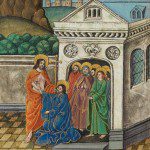![Rahab, The Harlot of Jericho by James Tissot [Public domain], via Wikimedia Commons](https://wp-media.patheos.com/blogs/sites/637/2017/04/Tissot_The_Harlot_of_Jericho_and_the_Two_Spies-222x300.jpg)
Joshua, the successor to Moses, had led the people of Israel to the promised land. He had the same name as Jesus, for Joshua and Jesus are two different renditions into English of the same Hebrew name. Thus, he was to be a type of Christ, and his life and activity as recorded in Scripture was to represent the work which was to be done by the true, eternal successor of Moses, Jesus Christ. To properly understand the Book of Joshua, we must understand the spiritual war which Jesus waged on our behalf. Jesus went behind enemy lines to meet us, and offer us the grace which perfect nature, the grace which heals us from our sins. We, therefore, should find ourselves typified by Rahab, so that when we hear the messengers of the Gospel and accept the truth of the faith, we can be said to let Jesus in, break down the sin in our lives, and so turn ourselves over to God and become holy men and women of God, as Origen suggested:
Nevertheless, our Jesus sends spied to the king of Jericho, and they are received hospitably by a prostitute. But the prostitute who received the spies sent by Jesus was no longer a prostitute since she received them. Indeed, every one of us was a prostitute in his heart as long as he lived according to the desires and lusts of the flesh. But she received the spies of Jesus, “messengers whom he sent before his face to prepare the way.” If any soul receives messengers in faith, it must not lodge them in low or inferior places, but in lofty and high ones. [2]
Rahab was told that she must put a sign above her house, a scarlet cord, which resembled the blood of the lamb put over the homes of the Israelites while in Egypt. It also foreshadowed the blood of the lamb of God which is to be shed for the sins of the world. All who cover themselves with the blood of the lamb, all who sign themselves with the sign of the cross, will find the wrath of God turned away from them so that they can receive his gracious love, as Ambrose explained:
A harlot saw this; and she who in the destruction of the city lost all hope of any means of safety, because her faith had conquered, bound a scarlet thread in her window, and thus uplifted a sign of her faith and the banner of the Lord’s Passion; so that the semblance of the mystic blood, which should redeem the world, might be in memory. So, without, the name of Joshua was a sign of victory to those who fought; within, the semblance of the Lord’s Passion was a sign of salvation to those in danger. Wherefore, because Rahab understood the heavenly mystery, the Lord says in the Psalm: “I will be mindful of Rahab and Babylon that know Me.”[3]
Likewise, the cloth can be said to represent the whole of humanity, the tie which binds us to Jesus, so that it can become red thanks to the shedding of his blood. Thus, St. Anthony of Padua was able to preach how Scripture saw linen as representative of flesh of Christ, and the scarlet cord, therefore, representative of the death of Christ on the cross:
The ’man clothed with linen’ is Jesus Christ, clothed with the linen of our flesh. The Father commanded him to make on the foreheads (the minds) of penitents who sigh in contrition and mourn in confession over all the abominations which they have done or which others do: TAU, the sign of the cross and the remembrance of his Passion. This is the sign of which the spies spoke to Rahab.[4]
Truly, the city of sin, with whatever name it should have, be it Jericho, Babylon – or Troy, is filled with people incapable of seeing and understanding all that is holy, so that the city of sin only judges by appearances. It welcomes all who seem to be true to the spirit of sin, all who show themselves to have indulged in human passions. It rejoices with those who believe it to be great, with those who like to reward it for its supposed greatness. Thus, sin and those who embrace its ways are easily distracted, willing to take any anyone who seems to follow in its footsteps as the bait by which it can be invaded and have the bounty of grace take down and destroy the city of sin from within. Rahab, the prostitute, shows us how grace takes in the signs and symbols of the world, so that, welcomed by the city of sin, it finds it has welcomed a Trojan Horse by which it has opened itself up to a divine invasion from outside.












